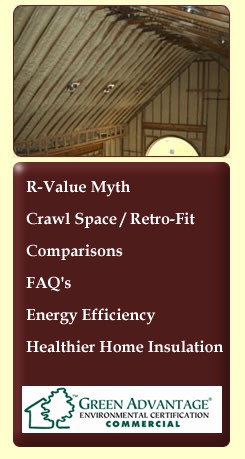GET EXCITED ABOUT YOUR INSULATION
Did you know that the insulation you choose for your new residence should contribute to the durability, energy efficiency, comfort, health and safety of your home? Most homebuyers get excited about selecting new appliances, counter tops, landscaping and other aesthetic items but rarely consider the variety of insulation materials available to the construction industry.
With the rising cost of energy, and a focus on health and environmental issues, architects and builders are recommending insulation materials that add significant performance value to construction projects. Open-cell spray foam is at the top of the recommended insulation materials list.
The structure of the spray foam is referred to as “open-cell” because air is trapped in small cavities that expand 120 times its initial volume, filling the building envelope with an insulation R-value of 4 per inch. The spray-applied foam forms an air seal that prevents air leaks and greatly reduces noise transmission through walls.
LOWER UTILITY BILLS
More than 40% of the energy consumed in a typical household goes to heating and cooling. Spray Foam insulation is a continuous air barrier system. When properly installed, the open-cell insulation prevents the conditioned air from escaping through building voids. Minimizing air leakage reduces HVAC equipment energy consumption, which lowers utility bills.
IMPROVED COMFORT
Radiant heat transfer between our bodies and surrounding indoor surfaces contribute to the physical comfort in a home. Heat can transfer by radiation into a wall and across the open-cell insulation. However, because the insulation is essentially joining walls at the same temperature, heat transfer by radiation is practically nonexistent. This helps to maintain an indoor temperature that improves occupant comfort.
ADDED RESALE VALUE
Polyurethane insulation offers impressive benefits as an alternative to traditional insulation materials. For example, Spray Foam reduces air infiltration, which lowers heating and cooling costs, and reduces the level of air-borne pollen, dust, and allergens from outside the home. In addition, Foam decreases the amount of moist air that leaks through the house, minimizing the opportunity for mold and mildew growth on or inside walls and ceilings. These benefits can translate into a higher resale
value of your home.
Consider these facts before you settle for conventional insulation materials:
Open-cell insulation is environmentally safe, fit for your budget, and can improve the overall performance of your home. Take an active role in the construction of your home by requesting open-cell spray foam to insulate your most valuable asset.
- 90% of all building failures in the U.S. are related to moisture.
- Air leaks can account for 99% of moisture movement in a residential structure, which can result in mold growth and unfavorable health effects.
- Air exfiltration can account for as much as 40% of residential energy loss.
|



